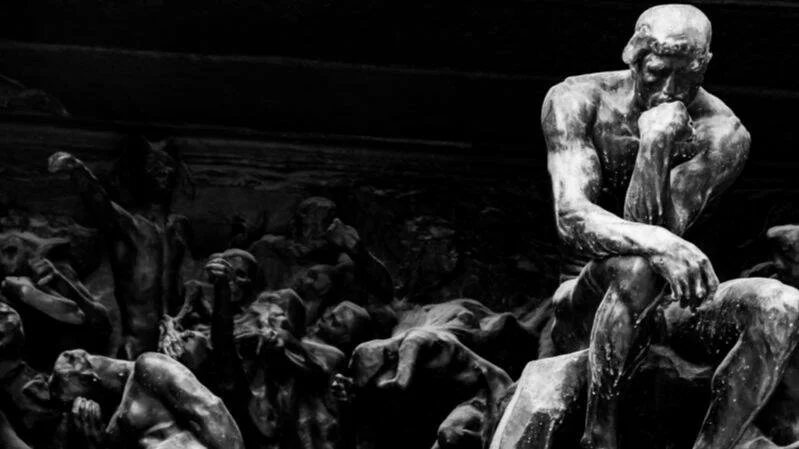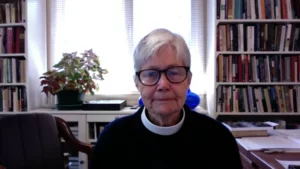Canto III
1. Death, Hope, Narrative, and Heroism
The first time through Inferno, adapting to the meter and encountering its strangeness can distract from some of its real horrors. But if we recall the invitation from Canto II to participate with our imaginations in evoking images the poet himself claims are difficult to describe, it can encourage us to slow down and try to appreciate more of the narrative.
I knew the phrase “Abandon all hope, ye who enter here” long before I read Inferno the first time. Its confidence and authority resonate with something deep within us, that is, our need for hope. Hope is a pillar of the spiritual life along with faith and love. To truly lack hope is to know real despair. In the darkest moments of any book or movie, hope that good will prevail carries us as readers through the otherwise insufferable tension.
Some popular narratives make a virtue of digging into the darkness while lacking a substantive concept of hope. For instance, I stopped watching The Walking Dead when I felt like it wanted to make me suffer more than it wanted to offer me hope. Manichean or even nihilistic narratives work by making the viewer, as the one who can confront and suffer through the evil, a Romantic hero of sorts, fronting the void and asserting his or her self-sufficiency to do so for little reason beyond will. Such narratives try to convince us to hope in ourselves (sometimes ironically, given their desperate view of human nature) or simply presume upon our hope in narrative, in the convention of the good guys winning. It’s still hope, albeit a thin one. It may not be possible to have narrative in true hopelessness. Hopelessness implies the end of story, the stasis of the souls in Hell who can only expect more of the same and who cannot improve their circumstances by any force of will or active choice. Dire words for our heroic age.
I had an opportunity to reflect on the importance of hope recently at the funeral of my wife’s grandmother. Our tears, the pastor said, signal the reality of our love for her, of course, but they are not tears of desperation, outrage, or offense; they are mingled with the comforting hope of eternity and the resurrection of the body. It can sound strange to be out and about in the world with its weak transcendence and then sit with a group of people rehearsing these ancient stories that can sound so magical and irrational, but when I give myself to the experience of the moment, to the fellowship and worship, I feel what it means to have a living faith, to be part of a living spiritual body that inhabits and exhibits truth.
Without transcendent hope what do we have? I’d guess we only have the attempt to encode our names in family and social memory, what they used to call fame. This ancient concept still motivates many of the spirits in Dante’s Hell; the irony is apparently lost on them that for the pilgrim to tell their stories entails that he reveal where their exploits landed them. Some were famous lovers or heroes or politicians or even popes, but their public notoriety did not earn them eternal rewards.
By comparison, Grandma Jean was a quiet person who was content to live what might look to some like a small, quiet life: a pastor’s wife, a choir director, a local musician. And yet when the people at her memorial remembered her they spoke of someone who brought warmth, love, and beauty to their world. There’s no need to romanticize her life—or her death—because she showed us the reality of Christian truth, and that is as much as any of us is called upon to do.
2. The Lukewarm
As someone who often feels ambivalent about controversial issues, the first souls Dante sees already distress me. These “souls unsure” who are rejected by both Heaven and Hell represent Dante’s conviction that decision and action are more praiseworthy than their contraries. It reminds me of the angel’s terrifying words to the Laodiceans in Revelation 3: “because you are lukewarm—neither hot nor cold—I am about to spit you out of my mouth.” Surprisingly, even Hell doesn’t want these souls, “lest the wicked of heart / Take glory over them.” Compared to these, even the damned could feel some satisfaction in having desired and lived for something.
When Woody Allen’s character Boris in Love and Death finally has a chance to assassinate Napoleon and prevent further war in Russia, he balks because, as he says, “I see both sides of every issue.” We can contrast that comic indecision with Bonhoeffer’s historical determination to participate in the plot to kill Hitler which, in its failure and his execution, had a tragic dimension. One of the first lessons of the Inferno is that we will all die, so we might as well die for something.
3. Contrapasso
The lukewarm are fated to chase a “whirling banner.” I imagine something like an eternal game of keep-away, with a demon waving the banner around to taunt the souls, who follow its erratic, random path for little other reason than that it’s there. The punishments in Inferno follow an allegorical logic called contrapasso, what we might think of as “the punishment fits the crime.” The lukewarm never committed to a cause, never “followed a banner” (e.g., as into battle) leading in a certain direction, but Dante implies they must have pursued random or arbitrary desires instead, like the person who picks up and drops some nugget of popular piety, theology, or morality just as often as something new and entertaining or self-congratulatory comes around. As you encounter each new punishment, it’s worth reflecting on how it extends or literalizes the souls’ chief vice.
4. Souls Under Judgment
Dante borrows a lot from Greek mythology, as he does here with Charon the ferryman who escorts souls over Acheron to the underworld. It strikes me in this passage that the pilgrim hears the souls “cursing the human race / God and their parents.” First, it’s interesting that they do not curse themselves; they see everyone else as the cause of their suffering. Second, their cursing must be futile. They are like children seeking to escape the intractable consequences of their actions, looking for that last chance to justify themselves because—like the rest of us—deep down it’s hard to really believe we deserve punishment; we don’t always believe we deserve love, either, but that doesn’t mean we are ready to accept actual alienation from God. What Dante suggests here at the river’s edge is that all these sinners share in common a failure to take real responsibility for their actions, and now they just sound absurd and immature.
Even more striking—and disturbing—is how at the end of the canto Virgil explains that these souls are in fact eager to get to Hell,
. . . . . . . . . . . . . . . . . . . . . . . . . for the goad
Of Divine Justice spurs them so, their fear
Is transmuted to desire. (103-5)
In Dante’s imagination, one would prefer eternal torment to the truthful gaze of God. If they can be said to hope at all, they hope desperately to be unseen or even forgotten by God. If you have any concept of God as love, this has to strike you with pity and terror.








Comments
Be the first one to make a comment!